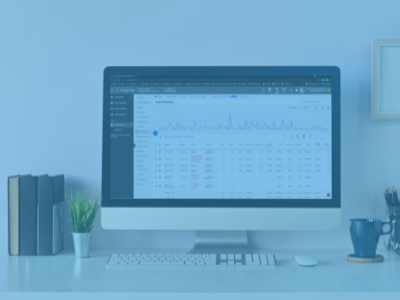Ever wonder why everyone is so up in arms about quality score? Need a refresher on what quality score even is? Then this is the blog for you.
When it comes to the search engine results page (SERP), Google’s number one goal has always been to serve the most relevant listings to users. No matter if the listing is organic or a paid advertisement, it’s not in Google’s best interest (or yours) to serve listings that aren’t relevant or useful to a user’s query. Quality Score (QS), first introduced in 2008, was created for this exact reason: to help advertisers serve more relevant and high-quality listings.
What is quality score?
Found in the Google Ads interface, Quality Score is a useful metric that assigns keywords a score of 1-10. It takes into account three factors: expected click-through-rate (CTR), ad relevance, and landing page experience. When evaluating an ad, each component is assigned a status of above average, average, or below average.
| Expected CTR | Ad Relevance | Landing Page Experience |
|---|---|---|
| This metric estimates the likelihood that an ad will be clicked based on the historical performance of your target keywords. | A measure of how closely related your keywords are to your ad copy. | A measure of how relevant and user-friendly the landing page is (navigation and speed). |
To sum it up, as Google puts it, Quality Score is a diagnostic tool that gives you an idea of how your ad quality compares to your competitors.
But that’s just visible quality score.
Let me explain.
Visible Quality Score vs. Auction Quality Score

What some may not realize is that there are technically two quality scores: visible quality score and auction quality score. Visible quality score is the metric advertisers have access to in the Google ads platform that determines your ad quality. Auction quality score, on the other hand, is a metric that advertisers cannot access. Google uses the auction quality score to determine your ad rank. It’s an important distinction to keep in mind because the two often get conflated with one another.
While visible QS is an amalgamation of the three factors mentioned above, auction QS is far more complex. Auction QS is given to ads in real-time during an auction and takes into account a number of factors including the query itself, intent, user location, time of day, device, and much more.
Why doesn’t Google share this auction quality score with advertisers?
Since auction quality score takes into account so many factors and changes constantly, the auction quality score wouldn’t actually be a very useful metric for advertisers to know. That’s why the quality score metrics Google does allow advertisers to see are much simpler and encompasses the elements that we do have control over.
Now back to the topic at hand…
Why should you care about (visible) quality score?
Short answer: because you should care about your ad quality and relevancy since those are controllable factors that determine how well your campaign is going to perform.
As I mentioned before, your visible quality score still tells you important information about your ad quality in terms of expected CTR, ad relevance, and landing page experience, which in turn gives you an idea of how to improve your ad quality for better auction performance. Again, ad relevance is what Google cares about the most. So, if you have poor ad relevance and therefore a low-quality score, then the algorithm isn’t likely to favour your ads, no matter how high you set your keyword bid.
The consequences of poor ad quality include:
- Ads not showing – poor quality ads can prevent them from entering an auction.
- Lower rankings – poor quality ads can prevent them from appearing in Google’s prime real estate: the top of the SERP.
- Higher CPCs – low quality ads drive up the cost you pay per click, even when there’s minimal competition.
- Ad extensions not showing –some extensions require ads to be in the top positions of the SERP and therefore won’t show if your rankings are being negatively impacted by low ad quality.
- Less conversions and high cost-per-conversion – Higher CPCs mean you pay more for less conversions, which in turn means less money in your pocket.
The cost is something you really need to worry about when it comes to QS because research shows that the lower the quality score, the higher you pay. Bidding on keywords with low-quality scores can increase costs by as much as 400%! Around here, we obsess about Quality Score because we know if ad clicks are cheaper, you can get more of them within your monthly budget.
| Quality Score | Ad Cost |
|---|---|
| 10 | -50% |
| 9 | -44% |
| 8 | -38% |
| 7 | -29% |
| 6 | -17% |
| 5 | BENCHMARK |
| 4 | +25% |
| 3 | +67% |
| 2 | +150% |
| 1 | +400% |
Source: Wordstream, What is quality score and how does it affect Google Ads
Now does this mean you should drop everything and go pause keywords with low quality scores? I would argue, no.
Like any metric in digital marketing, it shouldn’t be looked at in isolation, especially when visible quality score is meant to be a diagnostic tool rather than a key performance indicator. For example, if bidding on competitor keywords is a part of your PPC strategy, a low-quality score is to be expected. Moreover, if you have a low-quality score on a keyword that is still converting well, instead of removing the keyword altogether, the better solution is to take the low-quality score as a suggestion of which ad quality elements you could improve to help your ads perform even better.
You also need to keep in mind that even if you do make positive changes to your ad quality, that doesn’t necessarily mean it will automatically be reflected in your visible quality score, so ensure you are paying close attention to other engagement metrics to gauge the impact of your ad quality optimizations.
Final Thoughts
Quality score, at least the one advertisers have access to, is a good signal of your ad quality and should be monitored alongside other metrics when managing your account. Even as Google Ads continues to make great strides on the automation side of things, improving your ad quality still requires human intervention so make sure you don’t “set and forget” your campaigns.
If you’re seeing low quality scores on your Google Ads account but aren’t sure how to improve your ad quality, our PPC experts are here to help.







